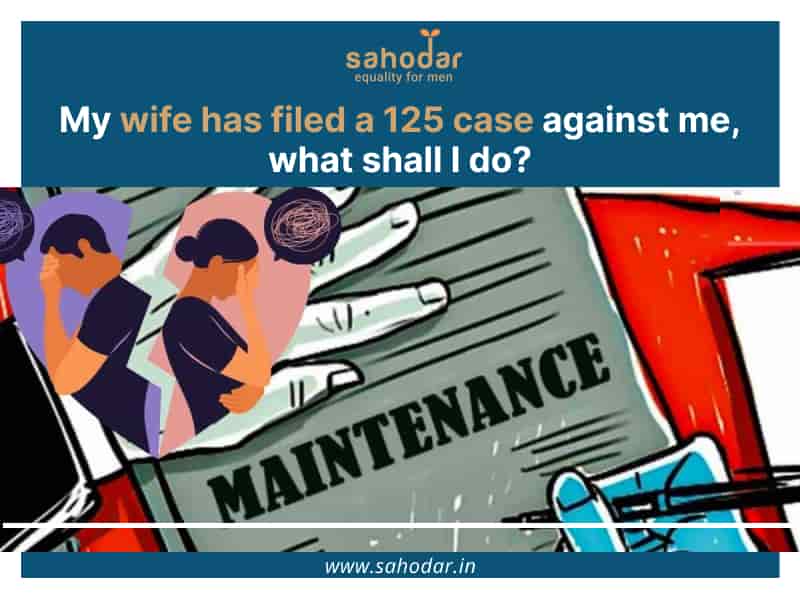In the realm of family law in India, Section 125 of the Code of Criminal Procedure (CrPC) holds significant importance. It mandates maintenance for wives, children, and parents who are unable to support themselves financially. This provision aims to prevent destitution and ensure a basic standard of living for dependents who may otherwise be neglected or abandoned. For husbands facing a Section 125 case filed by their wives, navigating this legal terrain requires a strategic approach, meticulous preparation, and adherence to legal procedures.
Understanding Section 125
Section 125 of the CrPC embodies the principle of social justice and equality by providing a legal recourse for individuals in need of financial support. It applies to husbands who have the means to support their wives but neglect or refuse to do so voluntarily. The primary objective is to compel the husband to provide maintenance to his wife, acknowledging her entitlement to financial assistance for sustenance.
Initial Steps and Legal Consultation
The journey begins with seeking immediate legal counsel upon receiving notice of a Section 125 petition. A qualified advocate specializing in family law can provide essential guidance tailored to the specifics of your case. Initial consultations are crucial for understanding the legal implications, discussing potential defenses, and outlining a strategic approach.
During this phase, it is imperative to gather and review all relevant documents pertaining to your financial status and any communication or evidence demonstrating the support you have provided to your wife. These documents will form the foundation of your defense strategy, helping to establish the factual basis of your financial contributions or any extenuating circumstances affecting your ability to pay maintenance.
Building Your Defense Strategy
Based on the information gathered and legal advice received, your legal counsel will assist in formulating a robust defense strategy. This strategy may include:
- Gathering Evidence: Collecting evidence such as income proofs, bank statements, tax returns, and any other financial documentation that substantiates your financial situation. This evidence should clearly demonstrate your income, liabilities, and financial responsibilities.
- Documenting Financial Support: Compiling records of any financial support you have provided to your wife, whether through direct payments, transfers, or contributions towards household expenses. These records serve to establish your ongoing support and financial involvement.
- Legal Arguments: Developing legal arguments based on the evidence gathered and applicable legal principles. This may involve demonstrating that you are already fulfilling your obligations, challenging the claims made against you, or presenting mitigating factors that affect your ability to pay maintenance.
Navigating Court Proceedings
As the legal process unfolds, active participation and adherence to court procedures are essential. Key aspects include:
- Court Hearings: Attending all scheduled court hearings punctually and respectfully. Your presence demonstrates cooperation and seriousness in addressing the matter.
- Presentation of Evidence: Presenting your case coherently and truthfully during hearings. This includes responding to questions from the court and presenting additional evidence as required to support your defense.
- Compliance with Court Orders: Adhering promptly to any court orders issued, including those related to interim maintenance or final judgments. Non-compliance can lead to legal repercussions and further complications.
Exploring Settlement and Mediation
In certain cases, exploring settlement through mediation or negotiation outside of court may be beneficial. Mediation offers an opportunity to reach a mutually acceptable agreement with your wife on maintenance terms, avoiding prolonged litigation and associated costs. Your legal counsel can facilitate these discussions and advocate for terms that align with your financial capabilities and obligations.
Emotional and Psychological Support
Navigating legal proceedings, especially those involving familial relationships, can be emotionally challenging. It is essential to seek emotional support from trusted friends, family members, or counselors who can provide perspective and encouragement during this stressful time. Maintaining emotional resilience and composure is vital for effectively navigating the legal process.
Professional Conduct and Court Etiquette
Throughout court proceedings, maintaining professionalism and respectful conduct is paramount. Addressing the court with courtesy, following procedural norms, and refraining from emotional outbursts or confrontations enhance your credibility and demonstrate respect for the judicial process.
Conclusion:
In conclusion, responding to a Section 125 case requires proactive legal action, meticulous preparation, and adherence to legal procedures. By seeking timely legal counsel, gathering pertinent evidence, and presenting a well-founded defense strategy, husbands can navigate this challenging legal terrain effectively. Each case is unique, and a personalized approach is essential for achieving a fair and just resolution. Your legal counsel plays a pivotal role in safeguarding your rights and advocating for your interests throughout the legal process. With diligence and professional guidance, husbands can navigate Section 125 cases with clarity and confidence, ensuring their legal rights and obligations are appropriately addressed.

